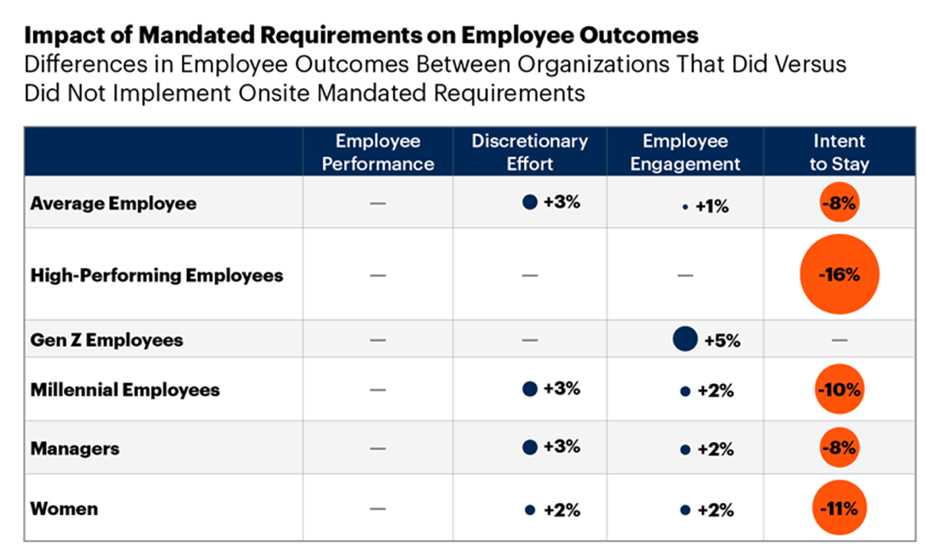When organisations implement rigid return to office (RTO) mandates, high-performers, women and millennials are the most likely to quit their job, according to research into the subject by Gartner – and almost half (48%) of all employees said that RTO mandates prioritise what leaders want over what employees need to do good work.
► Motivating rather than mandating is a more effective way to get people back in the office
► Employees should be involved in shaping policies

In Gartner’s survey of more than 2,000 knowledge workers taken between May and June 2023, intent to stay among average employees was 8% lower overall where a strict RTO mandate was in force. Among high-performing employees, their intent to stay was 16% lower with these RTO mandates, double the rate of average employees. Among millennials and women, the intent to stay was 10% and 11% lower (see chart).
‘Mandated on-site requirements can carry very steep costs for talent attraction and retention. This is especially true for high-performers, women and millennials – three employee segments who greatly value flexibility’, said Caitlin Duffy, director in the Gartner HR practice. ‘Often these costs far outweigh the moderate benefits to employee engagement and effort.’

Note: For most employees in this dataset, this RTO mandate meant working in the office five days a week. Others were required to work on-site two to three days per week. Note: Grey dashes indicate there was not a statistically significant difference. Note: Circle size varies according to the magnitude of the differences in employee outcomes (i.e., larger circles indicate larger differences). Source: Gartner (June 2023)
A September 2023 Gartner survey of 170 HR leaders found that 63% of HR leaders report an increased expectation around employees spending days in the office. Despite this increased in-person expectation, a June 2023 Gartner survey of nearly 3,500 employees, revealed that 48% of employees say their company’s mandates prioritise what leaders want versus what employees need to do good work.
Organisations are finding it challenging to get employees to return to the office more frequently
While in-person collaboration can yield moderate benefits, such as increased employee engagement, organisations are finding it challenging to get employees to return to the office more frequently. Some HR leaders have been met with low compliance after encouraging employees to spend more time in the office, causing them to resort to stricter RTO mandates.
Impact on high-performing employees
High-performers often react to RTO mandates as a signal that their organization doesn’t trust them with the autonomy to make the best choices about how they get their work done. Many of these employees feel that they have proven themselves and maintained high levels of performance throughout the pandemic and remote working.
“High-performing employees are more easily able to pursue opportunities at organizations that offer hybrid or fully remote policies,” said Duffy. “Losing high-performers to attrition cost organizations in terms of productivity, difficulty in backfilling the role, and the overall loss of high-quality talent available to fill critical positions.”
Impact on female employees
Throughout the pandemic, increased flexibility and the ability to work from home positively impacted women’s ability to manage work and life priorities in a holistic, integrated way. Beyond flexibility, female employees report they prefer remote settings due to fewer encounters with microaggressions and biases, as compared to when working in an office.
When organizations mandate rigid in-office times and days, women disproportionately face greater schedule complications and significant monetary costs related to caregiving responsibilities.
Impact on millennial employees
At this time, millennials are the generation most likely to have caregiving responsibilities and therefore benefit the most from added flexibility. Though going into the office can be beneficial for millennials – offering focus time away from potential distractions at home – Gartner data revealed that millennial employees' performance was lower at organizations with RTO mandates.
With more experience than their Gen Z counterparts, millennials chafe more at RTO mandates as they have a better understanding of what environment supports their work best yet are less able to customise their environments when forced to operate within rigid on-site requirements.
Designing a successful RTO policy
Gartner says that to prevent employee attrition, HR leaders should avoid rigid RTO mandates and instead seek to implement RTO strategies that maximise talent and business outcomes. Gartner has identified four best practices HR leaders should consider if their organisations seek to formalize in-office work requirements:
- Motivate employees to return to the office rather than mandate. Organisations can motivate employees to come to the office by designing their office space and hybrid policies to make employees feel capable, autonomous, and connected.
- Consider policies that focus on-site attendance per year, not per week. Gartner research found that organisations mandating a minimum number of in-office days per year achieve greater employee performance than those mandating a minimum number of in-person days per week.
- Enable employees to shape the RTO policy. Employees who contributed to their teams’ hybrid work arrangements and felt like their needs were considered demonstrated both higher engagement and work performance.
- Provide a clear reason behind requirements for working on-site. Organizations that transparently communicated their reasons for wanting employees to come into the office saw positive impacts on engagement, discretionary effort and retention.
Gartner clients can read more in the report: "Why Return-to-Office Mandates Aren’t Worth the Steep Talent Risks."

